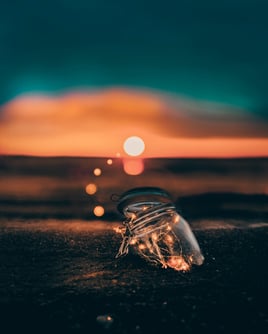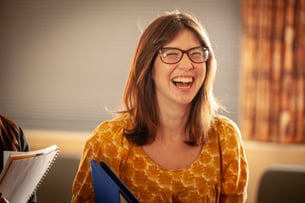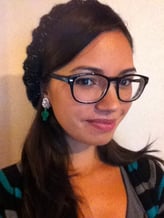A blog post by Melissa Ruisz Nazario
 In the preface to the thirtieth anniversary edition of her seminal book, Writing Down the Bones [1], first published in 1986, Natalie Goldberg explains why she thinks so many people want to write.
In the preface to the thirtieth anniversary edition of her seminal book, Writing Down the Bones [1], first published in 1986, Natalie Goldberg explains why she thinks so many people want to write.
“I don’t think everyone wants to create the great American novel, but we all have a dream of telling our stories–of realizing what we think, feel, and see before we die,” she observes. “Writing is a path to meet ourselves.”
The “bones” Goldberg wants her students to write down is, in her words, “the essential, awake speech of their minds.” She acknowledges this is easier said than done: “But I also know that I can’t just say, okay, write clearly and with great honesty. In class, we try different techniques and methods. Eventually the students hit the mark, come home to what they need to say and how they need to say it.”
 In the book, she proposed that by developing a writing practice similar to zen meditation practice, the ability to write well and develop a strong writing voice is available to everybody, not just a select chosen few. At the time, this was considered groundbreaking. Before the smaller, newer publisher Shambhala offered her a book deal, she recalled that when she sent the book proposal to seven large New York publishing houses, four of them not only took the time to send rejection letters, but to spend several paragraphs mocking her ideas.
In the book, she proposed that by developing a writing practice similar to zen meditation practice, the ability to write well and develop a strong writing voice is available to everybody, not just a select chosen few. At the time, this was considered groundbreaking. Before the smaller, newer publisher Shambhala offered her a book deal, she recalled that when she sent the book proposal to seven large New York publishing houses, four of them not only took the time to send rejection letters, but to spend several paragraphs mocking her ideas.
The success of Bones, which has sold more than one million copies and has been translated into twelve languages [2], speaks to the shift toward democratization in writing and publishing that Goldberg and others helped catalyze. “Little did I know I was breaking a paradigm of how writing was understood and taught in this country,” she writes. “At the time no writing sections thick with books of instruction and inspiration lined store shelves. I was struggling on my own to muster the courage to trust my mind and to place one word after the other on the page.”
 Many people who later read and raved over her book called her a genius. In the audiobook preface of Bones [3], she humbly counters that she knows she’s not a genius, but that her one moment of genius was, perhaps, the idea to put together zen and writing, of “having zen inform the writing,” as they both are simple practices with simple tools that also require the use of the mind. She’d been practicing zen meditation with a master for 10 years before writing the book in her 30s, and gives credit to her meditation teacher, a zen master, who told her after she spent nearly a decade in his zendo practicing meditation, “Why do you come to sit meditation? Why don’t you make writing your practice? If you go deep enough in writing, it will take you every place.”
Many people who later read and raved over her book called her a genius. In the audiobook preface of Bones [3], she humbly counters that she knows she’s not a genius, but that her one moment of genius was, perhaps, the idea to put together zen and writing, of “having zen inform the writing,” as they both are simple practices with simple tools that also require the use of the mind. She’d been practicing zen meditation with a master for 10 years before writing the book in her 30s, and gives credit to her meditation teacher, a zen master, who told her after she spent nearly a decade in his zendo practicing meditation, “Why do you come to sit meditation? Why don’t you make writing your practice? If you go deep enough in writing, it will take you every place.”
Writing and Depth Psychology
In her observations about the practice of writing and decades of teaching it, Goldberg uses language akin to depth psychology, such as the terms “unconscious” and “ego.” “Many people who want to write are unconsciously seeking a peace, a coming together, an acknowledging of our happiness or an examination of what is broken, hoping to embrace and bring our suffering to wholeness.” Writing is one way to bring awareness to the parts of us that are unconscious, with the aim of integrating them and becoming more whole, of walking the path toward individuation.
 Goldberg also advocates that writers “lose control” in their writing, that is, override the ego that would censor those fresh “first thoughts” out of social etiquette or fear of judgment. “Don’t think, don’t get logical,” she advises. “Go for the jugular. If something comes up in your writing that is scary and naked, dive right into it. It probably has lots of energy. These are the rules. It’s important to adhere to them because the aim is to burn through first thoughts to the place where energy is unobstructed by social politeness or the internal censor, to the place where you are writing what your mind actually sees and feels, not what it thinks it should see or feel. It’s a great opportunity to capture the oddities of your mind.”
Goldberg also advocates that writers “lose control” in their writing, that is, override the ego that would censor those fresh “first thoughts” out of social etiquette or fear of judgment. “Don’t think, don’t get logical,” she advises. “Go for the jugular. If something comes up in your writing that is scary and naked, dive right into it. It probably has lots of energy. These are the rules. It’s important to adhere to them because the aim is to burn through first thoughts to the place where energy is unobstructed by social politeness or the internal censor, to the place where you are writing what your mind actually sees and feels, not what it thinks it should see or feel. It’s a great opportunity to capture the oddities of your mind.”
Whereas the ego tries to shut down our first thoughts out of fear and protection from being ridiculed or attacked, first thoughts, Goldberg says, are unencumbered by the controlling ego. They are egoless. “So if you express something egoless, it is also full of energy, because it is expressing the truth of the way things are. You are not carrying the burden of ego in your expression, but are riding for moments the waves of human consciousness, and using your personal details to express the ride.”
Although terrified of being criticized herself for the ideas in her writing, Goldberg wrote in Bones that she wanted to finally “settle the self on the self,” to close the gap by removing the things that prevented her from being aligned with herself. “I was determined to meet who I was, to put down what I honestly saw and felt, letting my mind have free range, no curtailing or censoring.” It takes courage, and perhaps the willingness to be vulnerable, to write down and share those raw, uninhibited, egoless thoughts. But that is exactly where the writing gets interesting.
The Challenge of Writing
 In On Writing: Memoirs of the Craft [4], Stephen King uses the metaphor of thinking of writing as excavating. Writing can help unearth the treasures, the interesting thoughts you didn't realize were there all along, hidden in the unconscious. The struggle for many who wish to learn to write well, however, is being able to develop and maintain a writing practice long enough to discover those treasures. Beginning writers often have the misconception that everything famous published writers put down to paper is high quality. Because of this false assumption, novice writers will compare their work to the work of their literary heroes and heroines, and before they've had enough “butt-in-chair time,” or, as Toni Morrison says, enough “pages of throat-clearing” [5], they get discouraged and quit without giving themselves a chance to develop their own voice and craft.
In On Writing: Memoirs of the Craft [4], Stephen King uses the metaphor of thinking of writing as excavating. Writing can help unearth the treasures, the interesting thoughts you didn't realize were there all along, hidden in the unconscious. The struggle for many who wish to learn to write well, however, is being able to develop and maintain a writing practice long enough to discover those treasures. Beginning writers often have the misconception that everything famous published writers put down to paper is high quality. Because of this false assumption, novice writers will compare their work to the work of their literary heroes and heroines, and before they've had enough “butt-in-chair time,” or, as Toni Morrison says, enough “pages of throat-clearing” [5], they get discouraged and quit without giving themselves a chance to develop their own voice and craft.
In an interview in 2009, Ira Glass, host of the famous NPR radio show This American Life, addressed this struggle of giving up too early in the creative process. It is now famously shared as “The Taste Gap” or “Nobody Tells This to Beginners” [6], a piece of advice for not just creatives and makers, but anyone starting a new endeavor. Listen to him explain in the video:
The key, then, is to produce a lot of work and not give up, and after some time, the quality of your creative work will eventually catch up with your impeccable “taste.”
Writing Down the Soul
 For writers, workshops are one way to combat this “taste gap” or “stuckness.” Many well-known writers, including Toni Morrison and Natalie Goldberg, have utilized them in their writing practice. Writing workshops help hold aspiring writers accountable to a consistent writing practice. They offer participants the opportunity to share their work and to give and receive feedback, a vital exchange when one is too close to the writing to see objectively what may or may not be working. Similarly, workshops also help writers to gain perspective and can provide an antidote to the writer’s harsh inner self-critic that says “it all sucks.” Steven Pressfield personifies this voice as “Resistance” in The War of Art [7]:
For writers, workshops are one way to combat this “taste gap” or “stuckness.” Many well-known writers, including Toni Morrison and Natalie Goldberg, have utilized them in their writing practice. Writing workshops help hold aspiring writers accountable to a consistent writing practice. They offer participants the opportunity to share their work and to give and receive feedback, a vital exchange when one is too close to the writing to see objectively what may or may not be working. Similarly, workshops also help writers to gain perspective and can provide an antidote to the writer’s harsh inner self-critic that says “it all sucks.” Steven Pressfield personifies this voice as “Resistance” in The War of Art [7]:
Resistance will tell you anything to keep you from doing your work. It will perjure, fabricate, falsify; seduce, bully, cajole. Resistance is protean. It will assume any form, if that's what it takes to deceive you. It will reason with you like a lawyer or jam a nine-millimeter in your face like a stickup man. Resistance has no conscience. It will pledge anything to get a deal, then double-cross you as soon as your back is turned. If you take Resistance at its word, you deserve everything you get.
Perhaps best of all, writing workshops offer a sense of community and support for a craft that even Judy Blume [8] recognizes as lonely. When asked, “Is it fun to be a writer?” she responded, “Not always. It’s a solitary life and it can get lonely. You spend most of the day in a little room by yourself. But since I love to create characters and get to know them, I’m usually content.”
Pacifica’s 9-month Certificate Course in Memoir Writing, called Writing Down the Soul, offers the opportunity to write memoirs or shorter personal reflections in community with others in a safe, supportive environment. What makes it unique from other writing workshops, however, is that it combines depth psychological perspectives with the craft of memoir writing. You not only learn how to bring a soul-filled perspective toward creative imagination, but by the end of the course, you will be able to cultivate a sense of archetypal and mythic consciousness in your writing.
“Writing Down the Soul breathed beauty and life into my writing,” says Ruth Salmon, a previous student of the course. “It was a deeply rewarding experience. I highly recommend it to anyone who has the desire to write, deepen their connection with others and make meaning of their own lives.”
 The intensive certificate program begins in March 2019 and ends in December 2019. It has both an online component and a required beginning and ending residential component at Pacifica’s Ladera Lane campus in beautiful Santa Barbara, plus an optional third “Writer’s Week” residential session in August. Instructors Maureen Murdock, Ph.D., Daphne Dodson, Ph.D., and Jennifer Selig, Ph.D., are not only published authors, but trained in Jungian and depth psychology and psychotherapy.
The intensive certificate program begins in March 2019 and ends in December 2019. It has both an online component and a required beginning and ending residential component at Pacifica’s Ladera Lane campus in beautiful Santa Barbara, plus an optional third “Writer’s Week” residential session in August. Instructors Maureen Murdock, Ph.D., Daphne Dodson, Ph.D., and Jennifer Selig, Ph.D., are not only published authors, but trained in Jungian and depth psychology and psychotherapy.
In a feature article on Writing Down the Soul in The Writer Magazine [9], Dr. Selig recalls that Jung once said that the most important question you can ask yourself is “What myth are you living?” One of the things they do in the certificate program, she says, is to help students “discover the mythic patterns of their lives.”
In The Writer Magazine feature, Dr. Selig lists additional goals of the program and outcomes for participants:
- to help participants “become more conscious of new kinds of unconscious patterns in their lives”
- to develop more self-awareness
- to potentially provide the space for healing from some of the upset and the trauma of the past

In addition to these goals, students often build community by sharing their stories. Dr. Selig observes that there’s often a lot of laughter and tears at the residential sessions as they tell their stories and realize that many others may have experienced similar, often difficult or traumatic experiences as well, and that they’re not alone: “Sometimes we get trapped in the past and feel we're the only ones who've been through these things. There's a real sense of healing inside community.”
Unlike an M.F.A. program, Writing Down the Soul has no academic or degree requirements to join, only the desire to be in the program. Additionally, Dr. Selig points out that although it does teach the craft of writing and provides feedback on how to make one’s stories more appealing, the course is less about judgment and critical assessment, and more about discovery and recovery of a person’s own soul.
This holiday season, many are shifting away from giving each other “things,” and instead desire “experiential” gifts. Or, as Joseph Campbell eloquently expressed in The Power of Myth [10]:
People say that what we’re all seeking is a meaning for life. I don’t think that’s what we’re really seeking. I think that what we’re seeking is an experience of being alive, so that our life experiences on the purely physical plane will have resonances with our own innermost being and reality, so that we actually feel the rapture of being alive.
Instead of more “stuff,” consider giving yourself or a creative loved one the ultimate gift this season: the chance and the space to get better acquainted with the soul, alongside others who are walking the same soulful journey toward self-awareness, personal growth, and wholeness. For more information or to register for Writing Down the Soul, Pacifica's 9-month Certificate Program in Memoir Writing, please see our program page: https://retreat.pacifica.edu/writing-down-the-soul/
References
[1] Goldberg, N. Writing Down the Bones: Freeing the Writer Within. Thirtieth Anniversary Edition. Shambhala, 2016.
[2] "Natalie Goldberg, The Great Spring & 30th anniversary of Writing Down the Bones." https://www.bkwrks.com/great-spring
[3] Goldberg, N. Writing Down the Bones: Freeing the Writer Within. Audiobook. Sounds True, 1999.
[4] Zminda, P. "What Stephen King taught me about writing." The Writing Cooperative. https://writingcooperative.com/what-stephen-king-taught-me-about-writing-d3ef37ff6a5c
[5] Leclair, T. "The Language Must Not Sweat." The New Republic, 1981. https://newrepublic.com/article/95923/the-language-must-not-sweat
[6] https://www.youtube.com/watch?v=X2wLP0izeJE
[7] Pressfield, S. The War of Art. Black Irish Entertainment, LLC, 2002.
[8] Blume, J. "Questions for Judy." http://www.judyblume.com/about/questions/writer.php
[9] Tamarkin, J. "Writing Down the Soul." The Writer Magazine. https://retreat.pacifica.edu/wp-content/uploads/2016/12/The-Writer-magazine.pdf
[10] Campbell, J. The Power of Myth with Bill Moyers. Anchor Books, 1988.
 Melissa
Melissa



